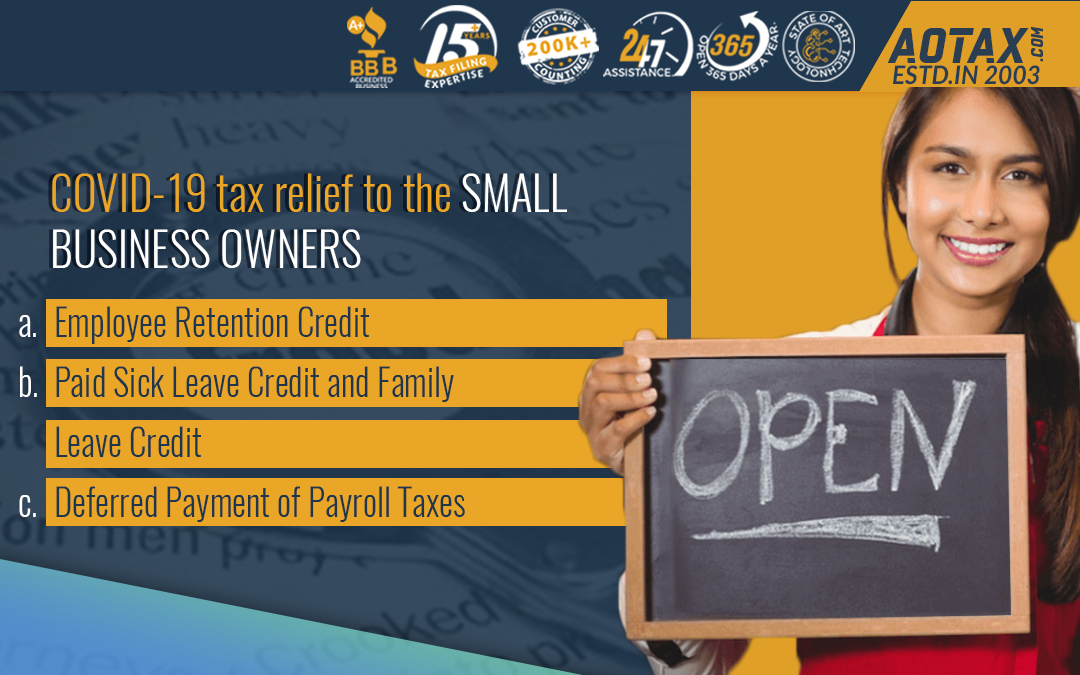COVID-19 tax relief to the small business owners

The pandemic COVID-19 has affected the economic condition across the entire United States. Business owners all over the country are struggling to survive and lower the impact of the pandemic on their business. Meanwhile, the US Government has introduced various forms by which tax relief can be obtained by the small business owners in the year 2020. Most of these changes belong to the FFCRA (Families First Coronavirus Response Act) and the CARES (Coronavirus Aid, Relief and Economic Security Act). These changes in tax regulations would be helpful for the business owners and the employees to survive the crisis caused by the pandemic.
Employee Retention Credit
The Employee Retention Credit is a part of the CARES Act which is mainly designed to keep the employees on the payroll during the times of pandemic.
- The refundable tax credit which is available is 50% of up to $10,000 in the wages that have been paid to the employees by a business owner whose business has been impacted by the COVID-19.
- This credit is available to all the employers irrespective of the size of the business and it also includes tax-exempt organic
- There are only two exceptions i.e. State and Local Government and their instrumentalities and those small businesses which take small business loans such as the PPP loans.
The qualifying employers for obtaining the Employee Retention Credit must fall into either of the two below-mentioned categories: –
- The employer whose business has been suspended completely or partially by the Government because of the coronavirus pandemic during this quarter.
- The gross receipts by the employer are below 50% of a similar timeframe in the year 2019. If the employer’s gross receipts are more than 80% of a similar timeframe in 2019, then they are not eligible for the credit after the quarter-end.
Paid Sick Leave Credit and Family Leave Credit
Paid Sick Leave Credit is designed in such a way by which the business would be eligible to obtain credit for an employee who has not been able to work because of having symptoms of coronavirus and is being quarantined or self-quarantined.
- Employees are entitled to the paid sick leave for up to 10 days at the regular rate of pay up to $511 in a day and $5110 in total.
- Employers are also eligible to receive credit for payment of those employees who are not able to come for work due to caring for a family member who has been affected by COVID-19 or for taking care of a child whose school/daycare is closed due to COVID-19.
- These employees would receive paid sick leave for up to two weeks at the two-third rate of the employee’s regular payment or up to $200 in a day and $2000 in total.
- Moreover, employees can also avail paid family and medical leaves which would be equal to two-thirds of their normal pay ranging up to $200 in a day and $10,000 in total.
- Also, qualifying leave of 10 weeks would be counted towards the family leave credit.
- Eligible employers or business owners can immediately receive this credit for sick leave and family leave along with the expenses for a health plan and the employer’s portion of Medicare tax on the employee’s leave.
- The employers eligible for receiving these credits will report their qualified wages and the associated cost of health insurance for each quarter on their employment tax returns for each quarter or by filing Form 941 which begins with the second quarter.
- In case, the employment tax details of the employers are not enough for covering the credit then the business owner can submit Form 7200 and receive the advance payment from the IRS.
Deferred Payment of Payroll Taxes
By the CARES Act, employers are allowed to defer the payment they do for their employee’s portion of the Social Security Taxes. These taxes would have been due in between 27th March 2020 and 31st December 2020. The employers can make these payments in the form of instalmentse. half by the end of 2021 and the other half by the end of 2022.
- There is no necessity of special election for the businesses for the deferment of their deposits and payments. The IRS is working on the process of revision of Form 941 for reflection of these changes.
- This option can be availed by most of the employers; however, those employers who have received the PPP loan would be able to defer the payments until receiving notice that their PPP loan has been forgiven.
Conclusion
So, these credits and tax rules will help the small business owners to save their business and also lower the impact of COVID-19.

Recent Comments